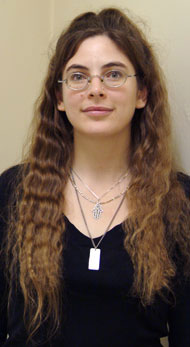PhD thesis takes Montreal prize
Catherine Leclerc examines languages in contemporary lit

Photo by Kate Hutchinson
Multilingualism is taken for granted in our global village.
“At Concordia you hear different languages all the time,” said Catherine Leclerc, who earned her PhD in Humanities here in 2004, “but they’re spoken.”
Leclerc wondered how that aural fact translated into fiction. By asking if it is “necessary for a novel to have a main language,” she identified novels with multilingual narrators.
Her resulting thesis, Des langues en partage? Cohabitation du français et de l’anglais en littérature contemporaine, was awarded the 2005 Prix d’excellence at the Board of Trade’s dinner honouring “great Montrealers” on Oct. 5.
Each year, the event singles out a handful of luminaries in cultural, social and scientific fields. At the same time, three PhD students are awarded prizes for their thesis work.
Leclerc’s work was recognized across a broad spectrum in the category of social sciences and humanities (the other two theses were in health sciences and natural sciences).
Leclerc was surprised and honoured that her work was acknowledged among so many disciplines.
An interest in multilingualism and translation issues brought her to Concordia, “I wanted to work with Sherry Simon. I am glad I did. I couldn’t have dreamed of a better supervisor.”
Exploring multilingual narrators led Leclerc to start with the languages she knew. She narrowed herself down to five different novels that use both French and English.
Leclerc considers the relationship between power and language important. Her work addresses the problems inherent in writing multilingually, specifically, how some attempts to be egalitarian can actually reproduce the hierarchies they seek to challenge.
She finds it strange that so many of the authors who write multilinguistically represent minority positions. Four of the five novels she looked at were written by Canadians who represent a linguistic minority (Franco-Ontarian, Acadian, Anglo-Quebecer).
Her research demonstrated that literature was not necessarily unilingual, historically, but has become more so since the beginning of European nationalism. Current efforts to work outside of that model, while fascinating, “won’t subvert the use of a single language.”
Leclerc points out that even though more and more people are multilingual, they are not all necessarily speaking the same combination of languages.
“If you write in one language, you invite people from many, but the more languages you include, the more you divide your audience.”
Currently, Leclerc is exploring how works written in multiple languages are translated and “how the translations convey that heterogeneity.” She’s curious about why so many Anglo-Quebec writers also work as translators.
Leclerc has recently started work as a professor at McGill’s department of French Language and Literature.